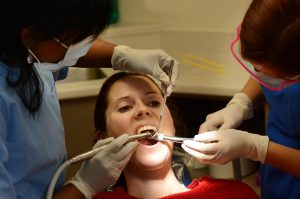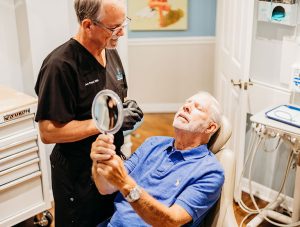Dental problems can come in all different disguises. If you feel a sharp pain when you bite down that disappears as soon as it comes, you may have a cracked tooth.
While teeth are perceived to be extremely resilient, it is important to remember that they are extremely hard-working, and in use every single day of our lives. Therefore, damage and trauma to them is quite common, and often occurs when you least expect it. Reach out to our Vero Beach, FL, dental office at (772) 778-5550 to ask any addition questions.

What Causes a Cracked Tooth?
A tooth may crack for a variety of reasons, including but not limited to:
- Trauma or accident, such as blunt force applied to the mouth
- Chewing on a particularly hard item such as hard candy, nuts or ice
- Grinding and clenching on a regular basis, often while asleep (known as bruxism)
- Brittleness as a result of root canal treatment
- Loss of a large part of the structure of the tooth, normally through wear and tear, cavity fillings and other restorative treatments, can lead to a tooth crack
- Uneven chewing pressure
- Exposure of the enamel to extremes in temperature in a short period of time, such as drinking ice water alongside eating hot food
In cases of broken teeth, protective measures can be taken to safeguard both the tooth and the mouth.
Definition of Cracked Tooth Syndrome
A cracked tooth, also known as a fractured tooth, occurs when a crack develops in the tooth’s structure. This crack can affect one or more layers of the tooth, including the enamel, dentin, or pulp. While some cracks may be small and superficial, others can cause the tooth to break or split. A fractured tooth can be quite painful and, if left untreated, may lead to more severe dental issues, such as infections or tooth loss.
Common Causes
Cracked teeth can result from various factors, many of which are part of everyday life. Biting or chewing on hard foods or objects, like ice or hard candy, can exert excessive pressure on your teeth, leading to cracks. Grinding or clenching your teeth, often unconsciously during sleep, can also cause repeated trauma, weakening the tooth over time. Accidents or trauma to the mouth, such as a blow to the face or a fall, can result in immediate cracks.
Additionally, natural aging makes teeth more susceptible to cracking as they become weaker. Large fillings or extensive dental work can compromise the tooth’s integrity, making it more prone to fractures. Even root canal treatments, while necessary for saving a tooth, can leave it more brittle and susceptible to cracking. Dental professionals can assist patients with broken or chipped teeth through various restorative and cosmetic procedures.
Age and Wear
As we age, our teeth naturally undergo wear and tear, making them more susceptible to cracks. Over time, the enamel—the hard, outer layer of our teeth—becomes thinner and more brittle. This increased brittleness makes it easier for cracks to form, especially under pressure. Additionally, years of chewing and grinding can cause micro-fractures in the teeth, which may eventually develop into more significant cracks. If you’re over 50, it’s essential to be more mindful of your dental health. Avoiding hard foods and wearing a mouthguard at night if you grind your teeth can help prevent cracks and maintain the integrity of your teeth.

Biting Hard Foods
Biting hard foods is a common cause of cracked teeth. Foods like ice, hard candy, and nuts can exert excessive pressure on your teeth, leading to cracks. If you have a habit of biting hard foods, it’s crucial to be more mindful of your eating habits. Try to avoid these types of foods or chew them slowly and carefully to minimize the pressure on your teeth. By being cautious, you can reduce the risk of developing cracked teeth and maintain your dental health.
Teeth Grinding
Teeth grinding, also known as bruxism, is a common habit that can lead to cracked teeth. When you grind your teeth, you’re putting excessive pressure on them, which can cause micro-fractures and eventually more significant cracks. If you grind your teeth at night, wearing a mouthguard can help protect them from damage. Additionally, reducing stress and anxiety—common causes of teeth grinding—can also be beneficial. By taking these steps, you can help prevent cracked teeth and maintain a healthy smile.
How to Identify a Cracked Tooth in Vero Beach, FL
It isn’t always easy to identify a crack as the cause of your tooth pain. Cracked tooth syndrome is a condition where a tooth has developed a crack that may cause pain when chewing or sensitivity to temperature changes. It may be difficult to pinpoint exactly where the pain is coming from, and hairline fractures can be almost impossible to spot, even on a dental x-ray.
If you are experiencing any sort of dental pain, such as from a chipped or broken tooth, you should arrange an appointment with your Vero Beach, FL, dentist as soon as possible. This is because your dentist has the tools necessary to be able to undertake a thorough examination of your mouth and determine the cause of the pain.
Diagnosing tooth cracks can be challenging due to the subtlety of the symptoms. If your broken or cracked tooth is the result of a trauma to your face or head, and you have any of the following symptoms, you should seek immediate medical help at your nearest emergency room straight away. Concerning symptoms that accompany a broken tooth as a result of a trauma include:
- Bleeding from the nose or ears
- Loss of consciousness
- Memory loss
- Disorientation
- Dizziness
- Severe headache
- Your teeth, which used to fit together before the trauma, no longer meet where they should
If you exhibit any of the above symptoms in conjunction with a cracked tooth, medical treatment may well take priority over any dental work.
If you have a cracked tooth, it’s essential to be aware of the signs of swelling and infection. Swelling or inflammation around the affected tooth can indicate an underlying issue. You may also experience pain, pus, or a bad taste in your mouth, which are signs of infection. If you notice any of these symptoms, it’s crucial to visit your dentist immediately. Prompt diagnosis and treatment can prevent the infection from spreading to the bone and gums, ensuring your overall oral health is maintained.
Types of Cracked Teeth
Cracked teeth come in various forms, each with its own characteristics. Craze lines are small, hairline cracks that only affect the enamel and are generally harmless. A fractured cusp occurs when a crack develops in the chewing surface of the tooth, often around a filling. A cracked tooth involves a crack that extends from the chewing surface down towards the root, potentially affecting deeper layers.
A split tooth is a more severe form, where the crack extends from the chewing surface down to the root, causing the tooth to split into distinct segments. Vertical root fractures start in the root and extend upwards towards the chewing surface, often requiring more complex treatment. Lastly, a chipped tooth involves a small chip or crack in the enamel, which can usually be easily repaired. Understanding these types helps in identifying the appropriate treatment and care for each specific case.
Cracked Tooth Treatment With Dr. Jonothan Royal
Treatment for a cracked tooth will depend on the extent of the damage and which tooth is affected. Cracked tooth treatment varies depending on the extent of the damage and the type of crack.
Preserving a natural tooth is important, as root canals and other procedures may result in teeth that are weaker than a natural tooth. If your dentist finds that the crack in your tooth is only minor, only affecting the enamel rather than the inner layers of the tooth, we may refer to it as a ‘craze line’ and not recommend any treatment. Craze lines are relatively common and nothing to be concerned about. If they are visible, by polishing your tooth your dentist can help to minimize their appearance.
If the crack has extended beyond the enamel, your dentist will recommend treatment to prevent further problems, such as a deeper fracture or an infection penetrating the tooth. Typical treatments could include a dental crown to cover the damaged tooth, root canal if bacteria are already present in the center of the tooth, or even an extraction.
In cases where the tooth cannot be saved, a tooth extraction may be necessary, followed by a dental implant to replace the missing tooth.

Reach Out to Vero Dental Spa Today!
If you suspect you have a cracked tooth or are experiencing dental pain, don’t wait for the problem to worsen. Reach out to our Vero Beach, FL, dentist to learn more about the dental services we offer by calling (772) 778-5550. We also proudly serve patients coming from Sebastian, Fort Pierce, Stuart, and the surrounding areas.
Additionally, we offer sedation dentistry to ensure a comfortable and stress-free treatment experience. Our team is here to help diagnose and treat cracked teeth, ensuring you get the care you need to protect your smile and oral health.
